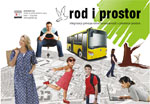
Gender and Space - Gender mainstreaming of spatial planning processes in Montenegro
In Montenegro, mainstreaming a gender perspective into plans and programmes at all levels is a legal obligation, which is not sufficiently implemented. The intention of the project “Gender and Space” is to encourage gender mainstreaming of the spatial development planning processes in Montenegro.
The project aims to increase awareness of the principles of gender mainstreaming among the actors involved in the processes of spatial planning in Montenegro.
The main activities of the project include:
- Conducting a pilot survey on a sample of 10 spatial planners from the area of Boka Kotorska in order to compare their experiences in both using and planning the space
- Organizing a workshop “Gender Equality and Spatial Planning” for 40 participants dealing with spatial planning and management in Montenegro
- Producing recommendations for gender mainstreaming of the planning processes in Montenegro
The total duration of the project is 5 months.
The budget of the project is € 6,970.00.
Donor: UNDP Montenegro
--------------------------------------
Description of the problem
Gender mainstreaming at all levels of a society’s development should not be a choice, but a binding and accepted approach. According to the Law on Gender Equality of Montenegro: “State administration bodies, local administration bodies, public institutions, public enterprises and legal persons with public authority, in all phases of planning, adopting and implementing decisions, and carrying out the activities, are obliged to assess and evaluate the impact of those decisions and activities upon the position of women and men, with the aim of achieving gender equality." This means that it is necessary to introduce a gender-sensitive perspective into all policies, programmes and measures, with the full acceptance of the fact that there are differences and inequalities between the position of men and women in the Montenegrin society. In July 2008, the Government of Montenegro adopted an “Action Plan for the Achievement of Gender Equality in Montenegro (2008-2012)”. This document identifies some actions and mechanisms that should contribute to improving the situation in Montenegro when gender equality is concerned. A research “The State of Women's Human Rights in Montenegro”[1] shows that the level of awareness of gender equality is still very low in all segments of the Montenegrin society. The situation is no different either when it comes to gender-sensitive approach to spatial planning. We are still at an early stage of not acknowledging (or rejecting) the problem of unequal position of women and men. The acknowledgement of this problem forms the basis for launching affirmative actions. Spatial planning creates a framework for all our activities. Today, planning is required to be integral, i.e. to consider, at the same time, different segments of development. One of these segments is certainly the achievement of gender equality and contribution to promoting equal opportunities through recognising the needs of both women and men. The reasons why it is important to include a gender perspective into planning processes - Planning is the means through which it is possible to promote gender equality in a society - Through a planning process both women and men (planners) can exert their influence - Women and men have different experiences that can be reflected in the space To conclude, in Montenegro, mainstreaming a gender perspective into plans and programmes at all levels is a legal obligation, which is not sufficiently implemented. The intention of the project “Gender and Space” is to encourage gender mainstreaming of the spatial development planning processes in Montenegro.
The aim and specific goals of the project Specific goals are to: - Improve the level of education on gender mainstreaming among the actors involved in the processes of spatial planning in Montenegro, through presenting both local and EU good practice experiences - Encourage the mainstreaming of a gender perspective into the plans being adopted in Montenegro, through implementing guidelines of gender-sensitive planning
Sustainability of the project - plans We are aware that the project “Gender and Space” will not result in immediate mainstreaming of all planning processes, but we believe it important to begin the process of information and awareness raising about this topic in Montenegro. It is the purpose of this project. Since our organization deals with spatial development issues, we intend to continue researching the connection between gender and space. Space concerns all citizens, and, therefore, in subsequent phases we intend to examine the ways in which space is used by ordinary people (not planners who are in the focus of this project), both women and men. In the region there are relatively little activities related to gender-sensitive planning and this topic could be a binding issue for some future regional projects (such as GenderAlp www.genderalp.at ) [1] Stanje ženskih ljudskih prava u Crnoj Gori / The State of Women's Human Rights in Montenegro , Anima Centre for Women and Peace Education 2009


